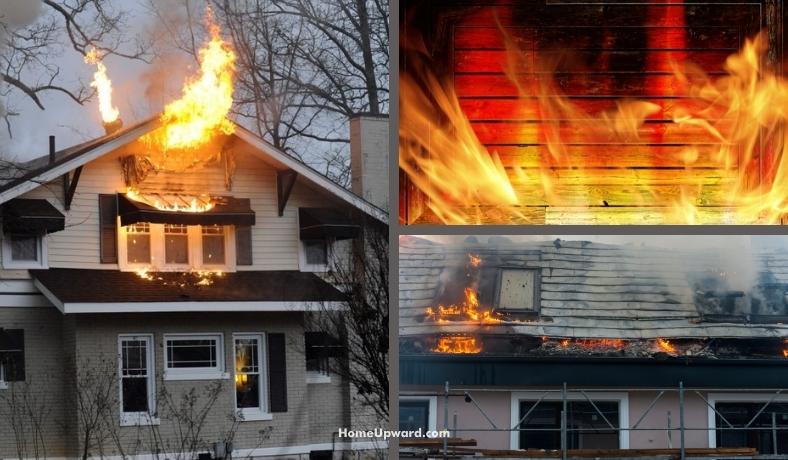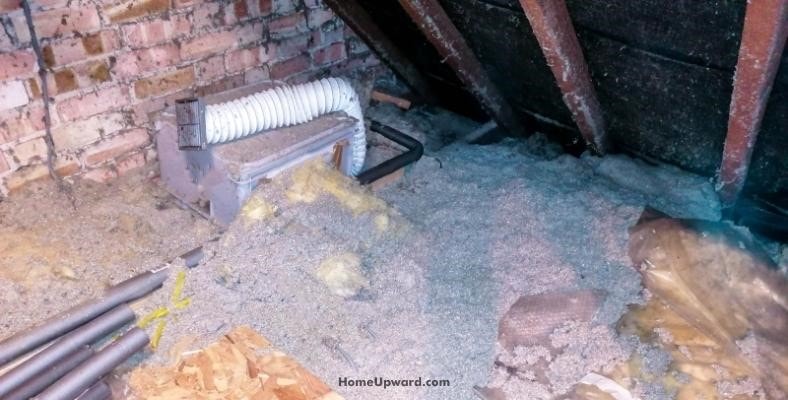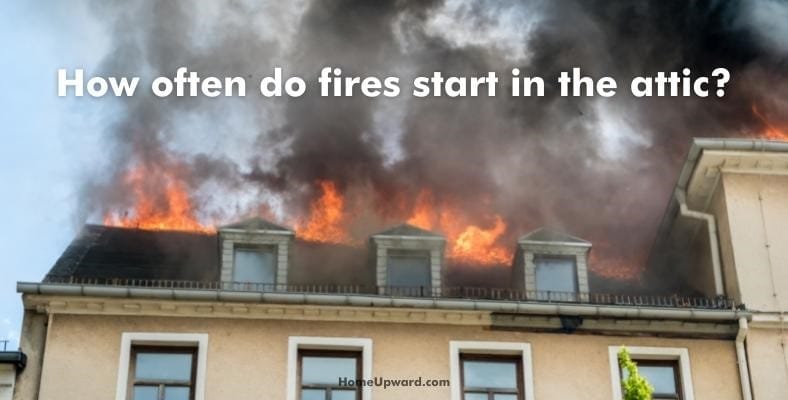Contents
What Causes Attic Fires?
The Most Common causes of Attic Fires
1. Electrical fire sources/circuit overload
Believe it or not, electrical fires are the most common type of fire each year. They often happen after pests start living in your attic and chew through wires or damage the attic fan for example.
This results in exposed wires having a higher risk of sparking and causing a fire due to the insulation getting chewed away. Other times, your breaker can overload and spark.
Attics somewhat tend to be a good source of flammable materials which can result in a fire breaking out.
2. Natural causes
There are several ways storms can cause a fire to break out in your attic:
- If water gets in, it can damage outlets or breakers, leading to a spark.
- If a tree or a tree branch falls into your attic there’s a risk of it damaging the electrical wiring.
- Lightening striking your roof or other parts of your house can cause a fire to break out.
3. Heating units/HVAC systems
Heating units and HVAC systems can overheat especially in the summer. Those installed in an attic are more prone to overheating because attics trap heat.
Older systems are also at risk of breaking down and having electrical issues. A fire can break out if a unit sparks and sometimes happens from overheating or electrical malfunction.
It’s an even bigger problem if lint has built up in them. Lint is highly flammable and can offer a way the fire to grow larger.
How Often Do Fires Start in the Attic?
Attic fires occur at an estimated rate of about 10,000 per year and happen most commonly in December and January. These two months alone make up around 23% of all residential attic fires each year.
House fires occur more often during the colder months and are most likely to start in the kitchen. While attic fires are definitely a potential safety risk you should also be careful to prevent all types of residential fires in any part of your home.
How Do You Know If Your Attic is on Fire?
Attic fires are tricky because attics don’t typically have smoke alarms to alert you when a fire has started. Also, smoke seldom travels downward into vents.
When you figure it out it can be too late and the damage can be very costly. In fact, you may not even know there’s a fire until it spreads throughout most of your attic or begins to enter the main areas of your home.
Here are some ways to know there’s an attic fire happening:
- Your home begins getting unusually warm suddenly. Fires generate quite a bit of heat from their flames and materials under combustion so the heat will quickly cause other parts of your home to rise in temperature.
- There’s an “off” or suspicious burning smell like burning wood, paper, plastic or fabric, and so forth. Anything stored in your attic may be subject to burning or melting which will produce a strong odor, smoke, or both.
If there’s enough smoke a fire can set off smoke detectors in your house even if you’re not in the same room. If the fire gets to the attic insulation it can spread on the flammable portion (although most insulation itself isn’t directly flammable).
How Do You Fight an Attic Fire?
The honest truth is that your best bet is to get help from your local firefighting department. Call 9-1-1 or the emergency number in your area immediately even while you’re evacuating.
However, if you do decide to fight an attic fire here are some helpful tips:
- Keep windows and doors closed to close the spread of fire and its access to fresh air (oxygen).
- You’ll need a fire extinguisher handy. Using water rarely works because a fire can evaporate water far to quickly to allow it to saturate burning materials. Spray the fire extinguisher at the base of the fire.
- Only enter your attic if there’s not excessive smoke. Excessive smoke can lead to smoke inhalation, burned lungs, and death. Small fires can be manageable with an extinguisher however.
- If the fire has not spread fully, if it’s safe to enter your attic you can also move aside nearby flammable materials to help keep it from going further or as quickly.
Your safest action should be getting out safely and requesting the fire department. One exception is if there’s a fire blocking your path that you can put out with an extinguisher.
Otherwise, it is best to leave it to the professionals.
House fire preparedness
- Before any emergency even happens, practice escape routes and have a plan with everyone that lives in your house. Fire safety practice is vital in these situations. If you have pets try to get them out if it is safe.
- Keep dog leashes and cat crates near the door. Otherwise, have possible locations and ways to wrangle them ready for the firefighters.
- Have important papers near your exit. Things like birth certificates or passports should stay together and in an accessible place to grab when evacuating.
When there is a fire, get everyone out of the house. Follow through with the plan you made and keep calm. Being prepared is hands down one of the single best ways to assure you can your family can get out safely in case the fire cannot be extinguished by you.
How Do You Prevent an Attic Fire?
Given how common attic fires are, it’s important to know what you can do to avoid having it happen to you as well. Here are some tips to help minimize the chance that electrical fires can start:
- To prevent a blown circuit breaker, keep the number of cables plugged into a single outlet or power strip to a minimum.
- Remove any other flammable items you can and try to keep your attic clean and clutter-free.
- Keep combustible things out of the attic.
- Take out any extra lint or trash from the attic.
- Vents should be regularly cleared of debris such as lint and dust.
- As water may cause electrical components to fail, look for a leaky roof. If you find a leak in your roof, call an expert right once to get it fixed.
- Do regular checks of your attic and any electrical equipment inside to ensure no chewed-through wires and that heating and cooling units aren’t overheating, damaged, or full of debris that can fuel a fire.
- Install a smoke alarm in your attic for early detection. There’s a good chance you can stip a fire from breaking out with smoke detectors alerting you.
- You can also have a home inspector check for any issues with your electrical system as well as other fire sources if possible.






